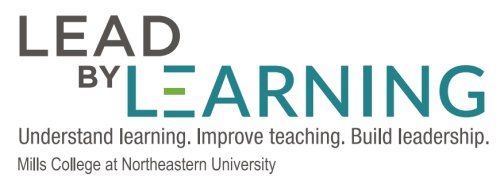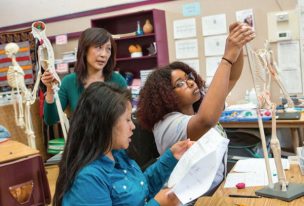Listening That Promotes Learning About English Learners
 Currently a doctoral candidate at Stanford’s Graduate School of Education, Suki Mozenter took part in the Alameda Unified ELD teacher scholars. Suki and her colleagues spent 2014-15 using inquiry to understand how to support English learners in their district. In this blog post, she discusses how a brief student interview reminded her of teachers’ important role in bolstering student academic identity, including a pride in the value of their home languages.
Currently a doctoral candidate at Stanford’s Graduate School of Education, Suki Mozenter took part in the Alameda Unified ELD teacher scholars. Suki and her colleagues spent 2014-15 using inquiry to understand how to support English learners in their district. In this blog post, she discusses how a brief student interview reminded her of teachers’ important role in bolstering student academic identity, including a pride in the value of their home languages.
Every year there seems to be a handful of students who do not make as much progress as their peers. They improve. Their reading levels go up. Their command of language expands. However, their gains are neither as great nor as rapid as I would hope.
As a teacher working predominantly with elementary students who are English language learners, I worry that these students who struggle academically – and do not make adequate progress – will develop into long-term English learners. Students who are long-term English learners are defined as students who have been in California schools for six years but have not yet reached a level of proficiency with the English language. Overwhelmingly, these students continue to struggle academically, do not feel a strong sense of belonging at school, and are at high risk for dropping out of high school – or even middle school.
When I reflected on my kindergarten through second grade English language learner students who seemed to fall further and further behind grade-level expectations, I felt a sense of urgency. I pictured them as long-term English learners, discouraged and disenfranchised adolescents who could not even imagine themselves succeeding academically.
What is the Missing Piece?
In working with the Mills Teacher Scholars program, I decided to focus my inquiry on some of these students. I wondered what was preventing them from succeeding academically, and I theorized that their identity as learners was playing a role. As my teacher scholar colleagues and I met to discuss and share our various paths of inquiry, we brought different pieces of student learning data to inform our understanding of students. Among these were: running records, writing samples, observation notes, and questionnaires students completed about their own identity and engagement in class.
Early in the inquiry process, our Mills Teacher Scholars facilitator encouraged us to bring audio or video evidence, including student interviews. My phone was already a familiar instructional tool for my students as I frequently recorded their conversations and presentations for either my own reflection or for classroom discussions. However, on the day of one particular inquiry session, I was running late and there were no student videos on my phone. The bell for dismissal had already rung, and I needed video data to bring to the meeting that afternoon. Luckily, Frankie walked by my classroom as he headed home.
Frankie typified the kind of student I was most concerned about. He was in first grade, but his writing and reading did not meet expectations for middle of kindergarten. He was new to our school but had attended kindergarten at another school in our district. His English proficiency was very limited, preventing him from fully communicating with his teachers, including myself. He worked with me in a small group for an hour every day, and he was making progress, but it was slow. And the grade-level expectations were quickly moving farther and farther from what he could do.
As he walked by with his cousin, I asked him if he’d answer a few questions for me. He agreed, his cousin waited outside, and I quickly landed on four questions: What at school helps you learn English? What at home helps you learn English? What at school makes it hard for you to learn English? What at home makes it hard for you to learn English?
These questions, basically, summed up my inquiry: Why are some of my students, including this first grader, really struggling to acquire English as a second, or third, language?
As I recorded on my phone, Frankie answered the first three questions easily. He talked about reading and spelling, watching TV and singing songs. For the fourth question though, “What at home makes it hard for you to learn English?” his answer floored me: “Speak Pilipino [his primary language].”
As I watched this video in my inquiry session, and shared it with my colleagues, I realized that this six-year-old boy thought that the language he shared with his mother, father, grandparents, aunts and uncles, and cousins was what got in his way when he tried to learn English. And, in this educational setting, English was the key to any sort of academic success.
New Understanding of Student Identity
As a teacher, I know that there is a strong body of research supporting bilingualism and biliteracy as contributors to academic success, but somehow I had missed that this student felt that his language – truly, who he was – prevented him from being academically successful and because of this, I had failed to build his own understanding of the value of his primary language.
Working with students in the early elementary grades, I hadn’t really paid attention to the negative aspects of their academic identity that these young learners had already developed or to the deep, personal causes of their disengagement. Part of why I had overlooked this aspect of instruction was due to its deep and personal, nearly invisible, nature. The bad thoughts students had about themselves weren’t usually on display in a way that was obvious to me. I didn’t hear the internal voices that told them why they can’t – and why they shouldn’t even try.
I didn’t hear them because I didn’t ask.
Although I was a reflective teacher who worked hard to build an inclusive and caring classroom, I had forgotten to ask the students the most critical questions: What helps you learn? What makes it hard for you to learn? And I hadn’t recorded those interviews to watch, on my own and with colleagues, in order to better understand what my students were really telling me.
Moving forward, I plan to spend more time using video to interview students. I want to ask them questions about what supports their learning, what gets in the way, and how they think I can help. I hope to take those videos to other teachers so that we can listen, together, to what our students have to say. Through this we can begin to do the work to build the sort of classrooms that build a robust academic identity for students like Frankie, and a pride in their primary language(s) as an asset that will contribute to their success in school and in life.
Suki Mozenter is a lifelong teacher with over twenty years of experience working in public school communities serving predominantly high-poverty, multilingual neighborhoods. She is currently still in the classroom, but as a student in the doctoral program at Stanford University, where she is learning how to ask better questions. Her work continues to focus on issues of equity and access for all students. When she is not tied to her computer, she enjoys taking long walks in the hills or along the bay with her family.

